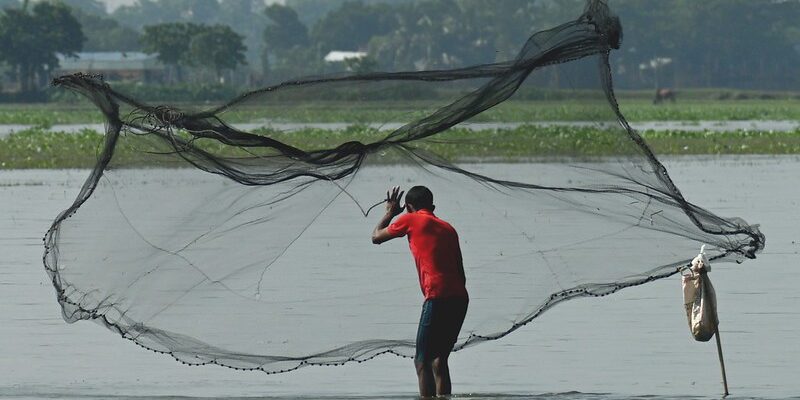11-02-2024
Yun Cheng
Bangladesh Campaign,
Global Human Rights Defence.
On February 10th, 2025 a report indicated that unchecked fishing is devastating indigenous fish species in Jamalganhj upazila towards extinction. With the use of destructive fishing techniques, large-scale pollution of wetlands, and subsequent negative impacts on other aquatic species, biodiversity loss, and environmental damage become increasingly prominent and urgent issues. (UNB, 2025) With the resolution of the UN General Assembly on July 28th, 2022 the right to a clean, healthy, and sustainable environment has become a widely accepted human right that is also linked to other fundamental human rights, such as the right to food, life, and water. (Gueye, 2022) Meanwhile, Article 18A of the Constitution of Bangladesh recognises that the State should protect the environment and natural resources for present and future generations. In this regard, illegal fishing practices and environmental degradation are more importantly a human rights issue, which requires the positive actions of the State to fulfil Bangladesh’s obligations to protect its people’s right to the environment and ensure the implementation of such protections.
The report concluded the causes of illegal fishing and the destruction of wetlands. Firstly, corrupt leasing drives leaseholders to chase higher profits through more efficient but unchecked destructive fishing practices. (UNB, 2025) Secondly, although Kamrul Hasan, acting Upazila Fisheries Officer of Jamalganj, demonstrated that closer monitoring has been exercised and immediate interventions such as the revocation of fishing leases will be taken, the enforcement and implementation of laws and policies concerning environmental protection in Bangladesh remain ineffective and weak. For example, the local indicated the allegedly protected wetland was drained constantly in 2023-2024 under the guise of the excavation, with no actual dredging conducted. (UNB, 2025)
Therefore, when environmental protection has become an essential element of fundamental human rights, Bangladesh, as a significant stakeholder of human rights protection, is required to issue stricter and clearer rules and corresponding implementation to effectively terminate the ongoing devastation of fishery resources and biodiversity in Bangladeshi wetlands and ensure the rights to the environment in line with international standards of human rights. On these grounds, professionals and scholars suggest that the government can reform the vague, inconsistent, and rather scattered legal provisions to formulate clear and just environmental laws and policies. (Sarwar, 2024) Additionally, stronger monitoring and judicial systems need to be established to improve transparency and accountability, ensure compliance, and grant environmental as well as human rights remedies under Bangladesh laws and international standards of human rights protection. (Bint-E-Basar & Tasnim, 2024)
Sources and further readings:
Bint-E-Basar, K. T., & Tasnim, K. S. (2024). ENVIRONMENTAL MANAGEMENT AND JUSTICE SYSTEM IN BANGLADESH: ISSUES AND LEGAL FRAMEWORK. Journal of Asian and African Social Science and Humanities, 10(1), 46–57.
Gueye, M. K. (2022, September 29). UN General Assembly recognizes human right to a clean, healthy, and sustainable environment | International Labour Organization. Www.ilo.org; International Labour Organisation. https://www.ilo.org/resource/article/un-general-assembly-recognizes-human-right-clean-healthy-and-sustainable.
Hasanat, A. (2021). Environmental Courts in Enforcement: The Role of Law in Environmental Justice in Bangladesh. Australian Journal of Asian Law, 21(2), 85–98.
Ishrak, T. M. M., & Shanta, S. P. (2023, August 7). Environmental protection laws need stricter enforcement. The Daily Star. https://www.thedailystar.net/opinion/readers-voice/news/environmental-protection-laws-need-stricter-enforcement-3388361.
Razzaque, J. (2000). Access to Environmental Justice: Role of the Judiciary in Bangladesh. SSRN Electronic Journal, 4(1 & 2), 1–25.
Sarwar, M. G. (2024, June 5). When law enables environmental damage. The Daily Star. https://www.thedailystar.net/opinion/views/news/when-law-enables-environmental-damage-3626731.
Sikder, P. K., & Faria, F. A. (2024, May 23). Fatal consequences of lead pollution in Bangladesh. The Daily Star. https://www.thedailystar.net/law-our-rights/news/fatal-consequences-lead-pollution-bangladesh-3617426.
UNB. (2025, February 10). Unregulated fishing devastates Jamalganj haors endangering biodiversity. Dhaka Tribune. https://www.dhakatribune.com/bangladesh/nation/373287/unregulated-fishing-devastates-jamalganj-haors
United Nations General Assembly. (2022). Resolution adopted by the General Assembly on 28 July 2022: The human right to a clean, healthy and sustainable environment (No. A/RES/76/300). United Nations General Assembly.







Comments